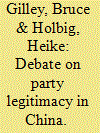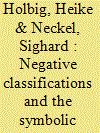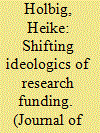|
|
|
Sort Order |
|
|
|
Items / Page
|
|
|
|
|
|
|
| Srl | Item |
| 1 |
ID:
168163


|
|
|
|
|
| Summary/Abstract |
In late 2017, the Chinese Communist Party proclaimed the “Xi Jinping Thought on Socialism with Chinese Characteristics for a New Era.” Most observers interpreted this step as just another update of the party’s ideological canon to accommodate Xi’s ambition to increase his personal power, following in the footsteps of Mao Zedong. This contribution argues that we can achieve a better understanding of the claim about a “new era,” if this claim is analysed diachronically as an ongoing process of constructing “chrono-ideological narratives” that link past and future, as well as synchronically in the larger context of recent constitutional and organisational changes. It finds that the “new era” discourse might, in the longer term, have ramifications not only for China’s domestic politics but also for the country’s self-image in the international arena too.
|
|
|
|
|
|
|
|
|
|
|
|
|
|
|
|
| 2 |
ID:
086328


|
|
|
|
|
| Publication |
2009.
|
| Summary/Abstract |
We report results here from a mixed quantitative-qualitative analysis of 168 articles published in China on the question of regime and party legitimacy. We find that ideology remains a leading strategy of future legitimation for the CCP, alongside better known strategies of institution-building and social justice. We also find that liberalism, while less often proposed, remains a potent critique of regime legitimacy. We use these results to make predictions about the evolutionary path of institutional change of China's political system, linking up Chinese elite debate with the wider scholarly debate of authoritarian durability.
|
|
|
|
|
|
|
|
|
|
|
|
|
|
|
|
| 3 |
ID:
146637


|
|
|
|
|
| Summary/Abstract |
This article explains a cultural sociological approach to research on social inequality. “Cultural sociological” means that we do not regard social inequality as resulting only from a distributive order of goods, income and positions, but also from an evaluative order created and reproduced by the actions of social groups. Concerning the topic of this thematic issue, this means that, from a sociological perspective, we see “weakness” not only as the social vulnerability of actors and groups resulting from a lack of material resources, education and power, but also as an attribution and assessment which can have a variety of social consequences. “Weakness” can compel others to help the weak and defend their interests. But if the weak are to be protected and empowered, they must be identified as “weak” in the first place, and this act of identification can have paradoxical consequences. As we demonstrate with evidence from East Asia, the social designation as “weak” can have many adverse effects for the weak groups themselves, because it blames them for their own weaknesses and publicly condemns, disparages, or stigmatizes them. Based on an analysis of the situation of victims of the Fukushima disaster in Japan and of rural migrants and their offspring living in Chinese metropoles, we show how social designations of weakness can produce negative classifications that signal disrespect to weak actors and limit their opportunities for action.
|
|
|
|
|
|
|
|
|
|
|
|
|
|
|
|
| 4 |
ID:
091522


|
|
|
|
|
| Publication |
2009.
|
| Summary/Abstract |
Two decades after the predicted end of ideology, we are observing a re-emphasis on party ideology under Hu Jintao. The paper looks into the reasons for and the factors shaping the re-formulation of the Chinese Communist Party's (CCP) ideology since 2002 and assessesthe progress and limits of this process. Based on the analysis of recent elitedebates, it is argued that the remaking ideology has been the consequence of perceived challenges to the legitimacy of CCP rules.
|
|
|
|
|
|
|
|
|
|
|
|
|
|
|
|
| 5 |
ID:
132728


|
|
|
|
|
| Publication |
2014.
|
| Summary/Abstract |
For more than two decades, the National Planning Office for Philosophy and Social Sciences (NPOPSS) has been managing official funding of social science research in China under the orbit of the Communist Party of China's (CPC) propaganda system. By focusing on "Major Projects", the most prestigious and well-funded program initiated by the NPOPSS in 2004, this contribution outlines the political and institutional ramifications of this line of official funding and attempts to identify larger shifts during the past decade in the "ideologics" of official social science research funding - the changing ideological circumscriptions of research agendas in the more narrow sense of echoing party theory and rhetoric and - in the broader sense - of adapting to an increasingly dominant official discourse of cultural and national self-assertion. To conclude, this article offers reflections on the potential repercussions of these shifts for international academic collaboration
|
|
|
|
|
|
|
|
|
|
|
|
|
|
|
|
|
|
|
|
|